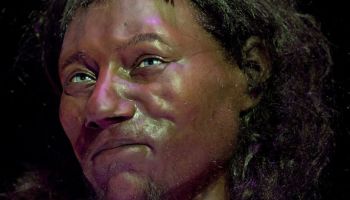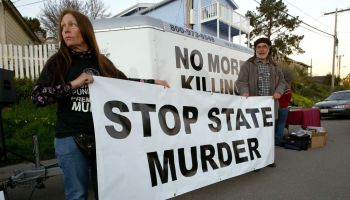NewsOne and Tom Joyner present BlackAmericanAgenda, the six issues we feel are the most important for Black Americans in this election year. Let it be your yardstick for measuring the merits of the politicians and parties on which you’ll be voting in November, bullets of wisdom for the ballot box.
For a list of all the BlackAmericanAgenda issues, CLICK HERE.
BlackAmericanAgenda | DISCRIMINATION
The Issues | The Backstory | Numbers To Know An Expert Says | What We’d Like To See | Policies To Support
THE ISSUES
By 2042, the majority of the U.S. population will be made up of people of color. But the lives of people of color are still beset by inequity and racism.
Black Americans face discrimination in everything from the job market, to housing, to education and healthcare, as well as the suspicions and aggressions — small and great — at the root of everything from Black women being followed by store security to a young Black man being gunned down by a neighborhood watch volunteer in Florida.
Discrimination is pervasive in a less visible but deeply ingrained system of inequity in everything from spending policies to transportation placement.
THE BACKSTORY
It was just four short years ago that Americans elected this country’s first African-American president. Folks in Harlem celebrated in the street, Jesse Jackson cried and some pundits said this country was officially post-racial. Not everyone believed that idea, though. Racial discrimination is alive and well in the United States. It affects everything from education to health care to employment to incarceration rates. Black Americans may also be disproportionately affected by other kinds of discrimination, such as gender and/or sexual orientation.
And despite statistics that show there is a disparity in treatment based on race, many White Americans refuse to acknowledge that discrimination is still an issue.
Now we are seeing discrimination in new ways. Companies don’t want to hire people who are currently unemployed, which affects African Americans disproportionately because the Black unemployment rate has been roughly double that of Whites for at least half a century.
NUMBERS TO KNOW
- In 2011, the U.S. Equal Employment and Opportunity Commission received a record 99,947 charges of discrimination. Approximately 35,395 or 35 percent were for race-based discrimination.
- According to a recent Newsweek/Daily Beast poll, 65 percent of Whites say that Blacks have already or will soon achieve racial equality, as opposed to 16 percent of Blacks. Forty-seven percent of Blacks say racial equality won’t be achieved in their lifetimes.
- Seventy percent of Whites think Blacks have the same chance as Whites to get housing they can afford, compared to 35 percent of Blacks, according to the Newsweek/Daily Beast poll.
- Seventy percent of Whites think Blacks have as good a chance as Whites to get a job they are qualified for, compared to 25 percent of Blacks, according to the Newsweek/Daily Beast poll.
AN EXPERT SAYS…
Angela Glover Blackwell, CEO of PolicyLink, says the way Americans think about discrimination has to change.
“Discrimination is misunderstood in the minds of Americans. Many Whites think discrimination is simply not renting your house to someone because of their color,” said Blackwell.
“But discrimination is when we underinvest in our public school system. When poor black communities don’t have access to a full service grocery store, someone has made the decision this community is not worthy. When bus service is poor and doesn’t link to the jobs in the suburbs, that’s discrimination. When no one cared about the foreclosure crisis until it started hitting white communities, that’s discrimination,” said Blackwell.
Another example is how our economy is changing to the point where a post-secondary degree is becoming a requirement for success, financial stability and mobility. Nevertheless, by 2018, 47 percent of Whites will have an associate or Bachelor’s degree while the number will be 27 percent for blacks. The legacy of poorly prepared secondary school graduates and community colleges not capable of properly preparing students of color is now beginning to have a major effect.
Meanwhile, Americans are still holding on to the idea that it is easy to move up in this country, said Blackwell. But for blacks born since 1961, 45 percent born into a middle-income household will end up poor compared to only 16 percent of whites. Across the board, 47 percent of daughters born to a poor family will remain poor. For sons, the figure is 35 percent.
The idea of austerity being pushed by many politicians will only make the problem worse, said Blackwell. There needs to be an investment in schools and public infrastructure such as transportation to provide the workers and the jobs the country needs to move forward.
And it’s not just an issue that will affect people of color.
“White people are in decline also. The middle class, which is what made America strong, is in severe decline. It is made up of more whites than anyone else,” said Blackwell. “The reason they not seeing it is there is a huge propaganda machine that is diluting people’s views.”
Another problem is that the “country’s racial divide has turned into a generational divide,” said Blackwell.
“We have invested in generation after generation but because young people are now made up of people color and older people are overwhelmingly white, our racial divide and lack of connection is causing problems. Older Whites don’t look at the faces of blacks and Latinos and see their future the same way they see it in white children. There is a lack of connection across race,” said Blackwell.
So when older whites don’t vote to raise property taxes to pay for school costs because the schools are becoming filled with more people of color, that also hurts whites at the school. When they are against transportation improvements because it looks like only blacks and Latinos ride the bus, they are also hurting young white workers trying to save money by not having to buy a car.
Maya Rupert, federal policy director for the National Center for Lesbian Rights, said African Americans’ battle against discrimination may ultimately behoove them to take up that battle for others. Sometimes, Rupert says, discrimination against other categories of people can have an spillover effect on the black community at large.
For example, Rupert says, there are no laws in place that protect LGBT’s from being discriminated against on their jobs on the basis of their sexual orientation. The same thing goes for the housing market. And laws that define marriage between a man and a woman and tie legally recognizable rights to that also affect blacks as a whole because we get married less than whites. That means our household structures look different. Should grandparents raising their grandchildren, for example, not be protected with certain rights?
Laws that allow employers to discriminate based on current employment status also disproportionately affect African Americans.
“The black community has been facing joblessness at a much higher rate and that will continue if they face discrimination to get a job because they don’t have a job,” said Rupert.
Rupert said housing discrimination based on the source of income has become another issue. For example, a landlord can decline to house a tenant because they are currently receiving a voucher to help pay their rent for example. Several states, including California, have adopted laws to make housing discrimination based on source of income illegal, but it is not in the federal statute.
“We have to look at this in a broader scope. We have to see that the same impulse that discriminates against one family structure discriminates against others. We have to be more exacting and realize they are talking about us,” said Rupert.
“We have very non-traditional families. The aunt or uncle or grandparents [who] are raising the children. There are a lot of people in the black community who would like to get married but aren’t.”
Blackwell said she’d like to see blacks join with groups such as gays and lesbians to form a united front against discrimination.
“Discrimination against anybody hurts all of us. I was thrilled when I saw black leaders and gay and lesbian leaders come together. We need to join ranks with anyone who understands discrimination hurts everybody. We need to build solidarity. I see no reason not to join with anyone who is willing to embrace our agenda,” said Blackwell.
WHAT WE’D LIKE TO SEE
- America needs to create a new narrative on discrimination that shows how we are all interconnected.
- Fight the propensity of older, white Americans to defund public services to younger brown and black people — in the name of austerity — by arguing forcefully for economic stimuli as a benefit to all Americans.
- Elimination of housing discrimination based on marital status or source of income, sexual identification or gender identification.
- Black Americans heading up a larger movement to fight all forms of discrimination, similar to the NAACP’s recent support of gay marriage as a civil right.
POLICIES TO SUPPORT
- A second stimulus. A bill that promotes investing heavily in infrastructure to build new roads, improve public transportation. This will help provide jobs while solving some issues of de facto descrimination.
- More investment in public education. Universal Pre-K so that children do not start school in a defecit. Investment in college education to make it more accessible.
- Focus on place-based discrimination by funding tax incentives and initiatives to encourage the launching of healthy grocery stores, equal access to public transportation, clean air and schools and community colleges performing at a high level.
- A jobs bill that prevents discrimination based on current employment status, sexual orientation and gender identification. “The law should be written so that people are hired or fired based solely off of job performance,” said Rupert.
- A federal law preventing housing discrimination based on source of income, sexual orientation or gender identification.
Want to Keep Up With NewsOne.com? LIKE Us On Facebook!
















